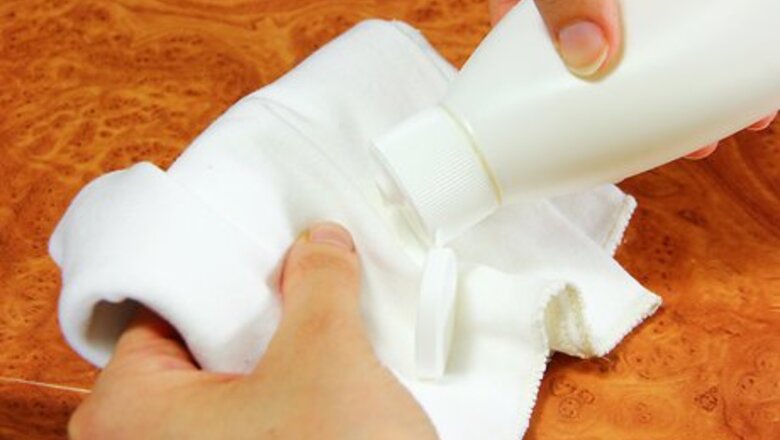
views
- For daily cleaning, use warm water and dish soap, glass cleaner, or an all-purpose cleaner. Wipe your counter using a soft, microfiber cloth.
- To remove stubborn stains, wipe your counter with acetone nail polish. For a deeper, sanitizing clean, clean your counter with rubbing alcohol.
- If your counter looks dull, pour a bit of mineral oil or Murphy Oil Soap on a cloth. Work the oil into the counter and buff out the excess with a clean cloth.
The Best Cleaners for Epoxy Countertops
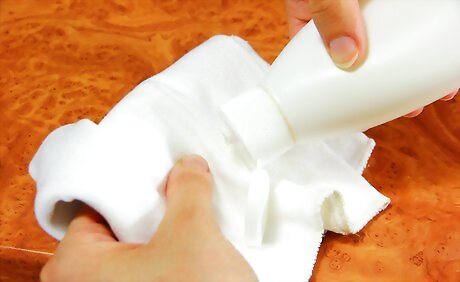
Wipe your countertop with warm water and dish soap. Dish soap cleans daily messes, removes stubborn stains, and restores shine to your epoxy countertop. Just mix a few drops of mild dish soap with warm water in a bucket. Then, wet a soft microfiber cloth with the solution and wipe down your counter. Rinse away any soapy residue with a damp cloth and dry your counter with a clean, dry cloth. Alternatively, fill a spray bottle with warm water and dish soap and spray your counter with the solution. Dish soap is a powerful but gentle cleaner and degreaser that can lift off stubborn stains like wine, coffee, juice, and grease. If you’re dealing with stuck-on debris, gently scrub it with a soft-bristled brush. Warning: Do not use abrasive cloths or scoring sponges to clean epoxy countertops, as they can scratch and dull the surface.
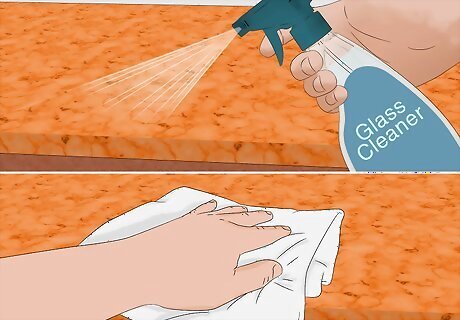
Clean stains on your countertop with glass cleaner. Glass cleaners easily wipe away debris and stains while reviving the epoxy’s high shine. Simply spray your countertop with the glass cleaner of your choice and wipe it with a microfiber cloth, paper towel, or chamois. Many glass cleaners have sanitizing ingredients that disinfect your counter as you clean up messes.
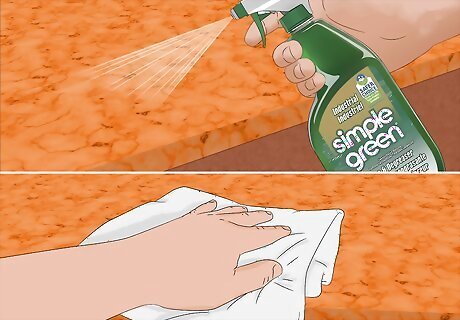
Use non-abrasive household cleaners like Crystal Simple Green. Most all-purpose cleaners and multi-surface household cleaners are safe and effective at cleaning your epoxy counter. Just spray the cleaner on your counter and wipe it with a soft microfiber cloth, paper towel, or sponge. Make sure your household cleaner isn’t labeled as abrasive and doesn’t contain any abrasive ingredients like small particles of quartz or silica.
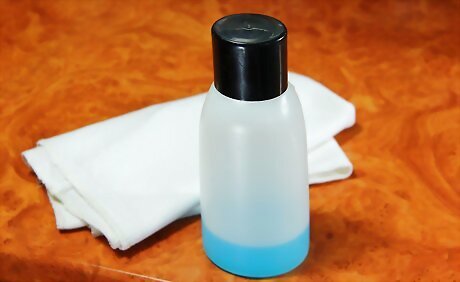
Remove heavy stains with acetone or paint thinner. Both acetone-based nail polish remover and paint thinner break down stubborn stains and stuck-on debris like coffee, red wine, and berries. Simply dip a white microfiber cloth into either cleaner and rub the stain using circular motions. If the stain doesn't lift up easily, apply more pressure as you rub. Acetone and paint thinner can also smooth out rough patches and light scratches. Make sure to use a white cloth or paper towel. Acetone and paint thinner can lift the dye in colorful cloths and potentially stain your counter. For your safety, wear gloves and a respirator mask and open nearby doors and windows. Acetone and paint thinner produce intense fumes and can irritate your skin.
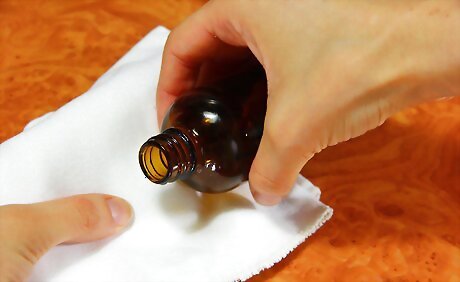
Clean and shine epoxy with mineral oil or Murphy Oil Soap monthly. If your countertop looks a little dull, pour a dime-sized amount of food-safe mineral oil or Murphy Oil Soap on a microfiber cloth. Simply rub the oil into your countertop using circular motions. Then, buff away any excess oil with a clean cloth. Do not use more than a dime-sized amount of oil, as too much can cloud your countertop's surface. Cleaning your countertop with oil too frequently can also give it a hazy appearance.
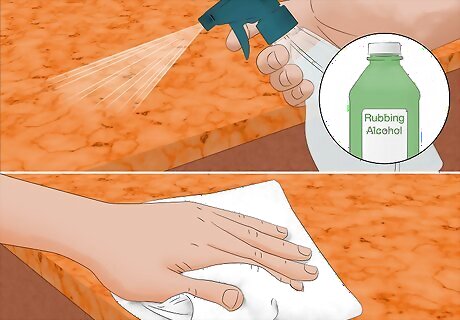
Sanitize your countertop with rubbing alcohol. Diluted concentrations of rubbing alcohol, like 70%, effectively clean away stains on your epoxy countertop and kill germs and bacteria. Fill a spray bottle with rubbing alcohol, spray it on your counter, and let it sit for at least 30 seconds. Then, use a microfiber cloth or paper towel to wipe down your counter. Rinse off any leftover rubbing alcohol with a clean, wet cloth. Then, dry your counter.
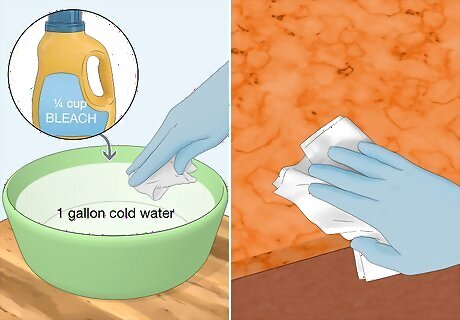
Disinfect and deep clean your countertop with bleach and water. For a heavy-duty clean that sanitizes and removes stubborn stains, use bleach. Mix ¼ cup (59 mL) of bleach with 1 gallon (3.8 L) of cold water. Then, dip a microfiber cloth in the solution, wring it out, and wipe your countertop. For your safety, put on gloves and a respirator mask and open your doors and windows. Bleach produces harsh fumes and can hurt your skin. Warning: Do not mix bleach with other cleaning agents, as this can produce a toxic gas. Sanitizing your counters with bleach can dull the epoxy’s shine, so use this method infrequently or if you don’t mind a matte countertop finish.
Polishing Epoxy Countertops
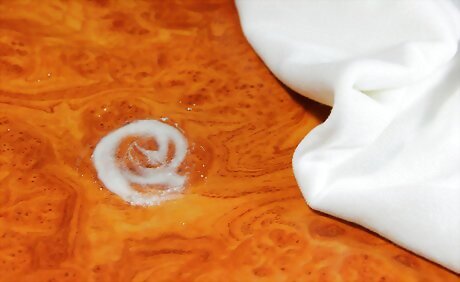
Apply coin-sized dollops of epoxy polishing paste on the countertop. Epoxy polishing compounds are made specifically to add gloss and shine back to your counter. Simply dot your countertop with quarter-sized amounts of the paste of your choice. If you see any noticeable scratches on your counter, apply the paste directly on the scratch.
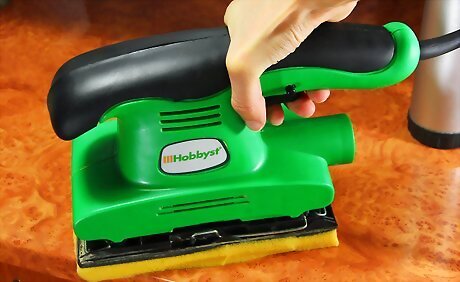
Rub the paste into the counter with a buffer attachment. Place a buffer pad and attachment on your drill. Then, turn the drill on to a low or medium speed and work the polishing compound into your counter using circular motions. The circular motions help prevent the buffer from leaving a streaky pattern on the countertop. For your safety, wear safety goggles and a respirator to protect your eyes and lungs from the polish. If you're sensitive to loud noises, put in earplugs. If you don't have a drill or buffer attachment, take a dry, microfiber cloth and work in the paste using circular motions and heavy pressure. To polish away scratches, move the drill back and forth over the scratch using circular motions.
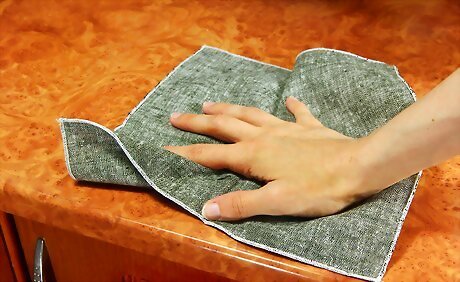
Wipe the polish residue off with a damp cloth, then dry the counter. Wet a microfiber cloth with warm water and squeeze out the excess moisture. Just wipe down your countertop to remove any leftover polishing paste. Then, use a clean cloth to completely dry off any moisture. Leaving your countertop to air dry can result in unsightly watermarks.
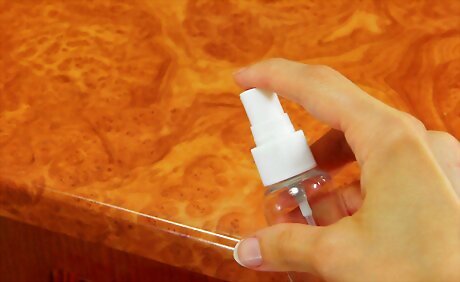
Apply a coat of liquid countertop polish. Liquid polish helps retain your countertop’s luster after polishing it and protects it against stains or scratches. Simply spray the liquid polish on your counter and work it in with a clean microfiber cloth. Generally, you only need to apply 1 coat of countertop polish. The liquid polish wears off over time, so reapply it every few weeks or whenever your counter starts to look dull.
Maintaining Epoxy Countertops
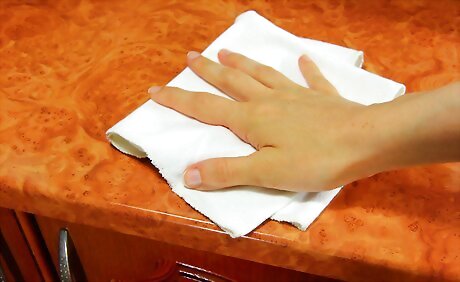
Clean spills as soon as they happen. The best way to keep your epoxy countertop stain-free and in tip-top condition is to wipe up messes and debris when you see them. Just use the cleaner of your choice to remove the spill. Do not use abrasive cleaners, cloths, or sponges to wipe down your counter, as they can scratch the epoxy.
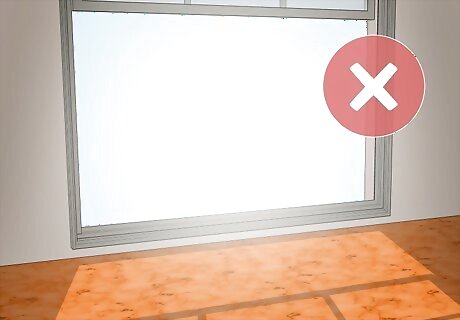
Keep heat and direct light away from your counter. Do not place hot pots, pans, and other items directly on your counter, as this can damage the epoxy. Instead, put a hot pad or trivet under your heated dishes. Limit the amount of sunlight you expose to the countertops too, as light can discolor your countertop. For instance, keep any window and door shades closed when sunlight normally hits your countertop.
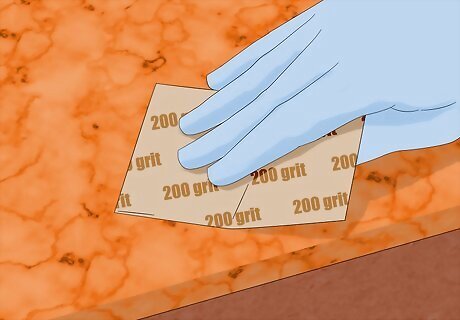
Repair scratches and imperfections with 200-grit or 400-grit sandpaper. With everyday wear and tear, your epoxy countertop might get scratched or damaged. Luckily, all you have to do is sand down the scratch or imperfection with 200- to 400-grit sandpaper. Then, simply clean the spot with a microfiber cloth and acetone. Apply polish on top of the sanded spot to restore the shine. If the scratch was deep and you sanded away a lot of epoxy, simply pour new epoxy over the spot.



















Comments
0 comment